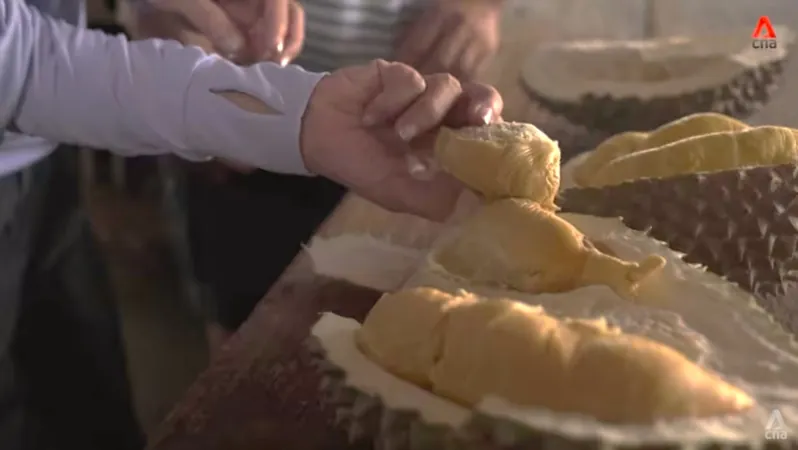
Are New Durian Varieties Just a Marketing Fluke? The Truth Behind Tupai King and More!
2024-09-21
SINGAPORE: The Durian Market Landscape
In the tropical realm of fruits, the durian is undeniably crowned the monarch. However, as the season unfolds, the durian world sees a surge of new contenders aiming for the throne, including the trendy Tupai King and Black Thorn, which have recently stirred the pot in local markets.
While traditional favorites like Mao Shan Wang and D24 have solidified their status, the rise of these new varieties boasts staggering price tags—up to 90% more costly than their classic counterparts. This spike in price has left durian enthusiasts, like regular consumer Andrew Yeo, scratching their heads. Yeo encountered a shop sign promoting Tupai King but also displaying Mao Shan Wang, leading him to question, "What am I actually paying for?" This confusion raises eyebrows as various sellers offer differing views on these new durian labels.
The burning question remains: are these new durians a genuine phenomenon, or just a clever marketing ploy?
The Mystery of Tupai King
Tupai King, also known as Squirrel King, has garnered attention over the past three years due to its unique characteristics. Unlike the common practice of opening durians from the bottom, this variety is opened from the top, revealing its thinner skin. Its flavor profile tends to lean more towards bitterness compared to the renowned Mao Shan Wang and features a distinctive greenish hue, with some describing a light alcoholic aftertaste.
Diana Ser, the host of Talking Point, sought answers in Penang and met Chew Chee Wan, the pioneer grower of Tupai King. Chew holds a registration certificate from the Malaysian Agricultural Research and Development Institute but ironically doesn’t sell his prized durians in his shop due to their scarcity—producing around a thousand during the season compared to Singapore's 100 tons of total durian imports catching the public's eye daily.
Chew explained, "Fruits that are grafted on older trees yield high-quality durians after three and a half years," and though he began cultivating the Tupai King only in 2022, it will take 5 to 10 years before we see a significant market presence in Singapore.
Unmasking Mislabelled Durian
Renowned durian seller Kelvin Tan shared that the chances of encountering an authentic Tupai King in Singapore are slim, suggesting what consumers may be buying are imposters instead. To clarify this further, five durian experts critically evaluated a local stall's Tupai King, which was priced at S$58/kg. Their findings were startling—most identified the fruit as a mere Mao Shan Wang due to its yellow flesh.
This case of misrepresentation isn't unique. A durian marketed as "Old Tree" at S$18/kg was unveiled to be a Thai Chanee, raising questions about the integrity of such classifications. In Penang, the myths surrounding "Old Tree" durians proliferate; sellers often haven’t accurately distinguished between varieties based on tree age, leading to widespread skepticism of these claims.
Experts argue that many names, such as Black Gold or King of Kings, are rebranded iterations of the classic Mao Shan Wang. While this marketing strategy garners interest, it can potentially confuse consumers.
Navigating the Durian Market
So, how can durian aficionados navigate this misleading market landscape? Experts emphasize purchasing from reputable vendors to avoid pitfalls associated with stale or mislabelled durians. Knowledge is power; buyers should familiarize themselves with the traits of different durian varieties. Tan warns that online scams are rampant due to the anonymity of sellers, hence checking seller reviews is crucial.
When shopping for durians in person, consider these five S's:
1. Choose durians weighing between 1.7 to 2.2 kg, as larger fruits may be overripe.
2. Conduct the stem test; a green stem indicates freshness.
3. Examine for spoilage signs such as cracks.
4. Shake the durian: A loud sound indicates overripeness, while a gentle sound suggests it's just right.
5. Use your nose—ripe durians emit a strong aroma, while unripe ones have little scent.
For those who wish to avoid hype altogether, Yeo suggests sticking with the classic Mao Shan Wang and appreciating the natural variability each fruit provides.
In the ever-evolving world of durians, knowledge, and a keen eye are the keys to enjoying this unique delicacy without falling prey to misleading marketing tactics.


 Brasil (PT)
Brasil (PT)
 Canada (EN)
Canada (EN)
 Chile (ES)
Chile (ES)
 España (ES)
España (ES)
 France (FR)
France (FR)
 Hong Kong (EN)
Hong Kong (EN)
 Italia (IT)
Italia (IT)
 日本 (JA)
日本 (JA)
 Magyarország (HU)
Magyarország (HU)
 Norge (NO)
Norge (NO)
 Polska (PL)
Polska (PL)
 Schweiz (DE)
Schweiz (DE)
 Singapore (EN)
Singapore (EN)
 Sverige (SV)
Sverige (SV)
 Suomi (FI)
Suomi (FI)
 Türkiye (TR)
Türkiye (TR)